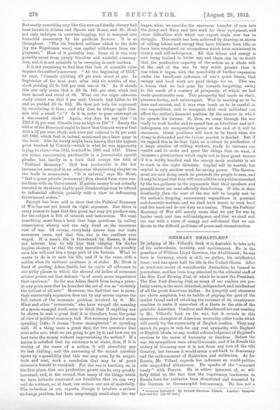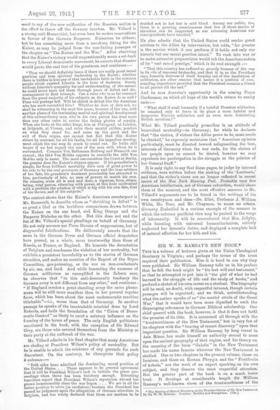GERMANY EMBATTLED" IN judging of Mr. Villard's book it is
desirable to take note of his antecedents, heredity, and environment. He is the grandson of William Lloyd Garrison, the Abolitionist; be was born in Germany, which is still, we gather, his intellectual home; and has spent half his life in the United States. After an academic career of considerable distinction, he turned to journalism, and has been long attached to the editorial staff of the New York Evening Post, of which he is now the President. The New York Evening Post, as many of our readers are pro- bably aware, is the most detached, independent, and intellectual of all the great American dailies. Its integrity and cleanness are above suspicion, but its habits of playing the part of the candid friend and of rebuking the excesses of its countrymen combine to make it somewhat of a thorn in the side of the patriotic American. Candour and detachment are not wanting in Mr. Villard'a book on the war, but it reveals in this strenuous champion of American neutrality other traits which will sorely try the equanimity of English readers. They may search its pages in vain for any real sympathy with England or English ideals, or any cordial acknowledgment of England's services to the cause of humanity or freedom. Before the war his sympathies were ultra-Germanic, and if he dreads the victory of Germany now it is not from any love of the Old Country, but because it would mean a set-back to democracy and the enthronement of Kaiserism and militarism. As for Russia, Mr. Villard regards her influence on world-politics with unqualified abhorrence. He speaks of the " accuraed treaty" with France. He is either ignorant of, or wil- fully blind to, the fact that the reactionary tendencies in Russia have for centuries been stimulated and fomented by the German or Germanophil bureaucracy. Ho has not a • Germany Embattled. By Oswald Garrison Villard. London: Sampson Low and Co. [4e. 6d. net.] word to say of the new unification of the Russian nation in the effort to throw off the German incubus. Mr. Villard is a strong anti-Monarchist, but even here he makes reservations in favour of the German Emperor. Kaiserism he abhors; but he has something more than a sneaking liking for the Kaiser, as may be judged from the concluding passages of the chapter on" The Kaiser and the War." After observing that the Kaiser's victory would unquestionably mean a set-back to every Liberal democratic movement, he asserts that disaster would prove the real test of his greatness, and continues :— " Then we should definitely learn if there are really great moral qualities and true spiritual leadership in the i Kaiser; whether there is hidden in him any of that unshakable faith n the common people which exalted Lincoln in the hour of darkness. Surely without Lincoln's sympathy for and understanding of the masses he could never have led them through years of defeat and dis- couragement to final triumph. Can a ruler who is as far removed from the great majority of his subjects as the Kaiser do as well ? Time will perhaps tell. Will he shrink in defeat like the American who has most resembled him ? Whether he does or does not, we shall be witnessing in the next few years, because of the war, still another phase of the fascinating mental and spiritual development of this extraordinary man, who in his own person has done more than any other ruler to revive the fading glories of royalty. When one looks at the other kings, him at Petrograd, at London, at Belgrade, at Vienna, and rates their mental calibre, ponders on what they stand for, and sums up the good and the evil of their reigns, one cannot but feel that this Kaiser shines by contrast, for all his faults, for all his imperfect develop- ment which the war may do much to round out. lb e bulks still larger if we but regard the size of the men with whom ho is surrounded. Compare Von Bethmann Hollweg and Bismarck one cannot ; the 1914 Von Moltke appears to resemble the 1870 Von Moltke only in name. The more one considers the Court at Berlin, the greater does the Kaiser's stature appear. If his grandfather's simple, far from brilliant mentality drew men of great power to his side to be the real governors of Germany and the true arbiters of her fate, his grandson's dominant personality has attracted to him, particularly of late, no men of powers to match his own. He remains, when all is said and done, a vigorous, keen, stimu- lating, vital person, vibrating with power, at this hour confronted with a problem the solution of which is big with his own fate, that of his throne, and of his subjects."
The context shows that the Kaiser's American counterpart is Mr. Roosevelt, to describe whom as "shrinking in defeat" is as great a libel as the invidious comparisons drawn between the Kaiser on the one hand, and King George and the Emperor Nicholas on the other. But this does not end the list of Mr. Fillard's special pleadings on behalf of Germany. He not only accuses our Press Bureau of suppressions, but of disgraceful falsifications. He deliberately asserts that the news in the German Press and Gorman official despatches have proved, as a whole, more trustworthy than those of Russia, or France, or England. He laments the devastation of Belgium and condemns the violation of her neutrality, but exhibits a persistent incredulity as to the stories of German atrocities, and makes no mention of the Report of the Bryce Committee, gas-poisoning, or the war on non-combatants by air, sea, and land. And while lamenting the excesses of German militarism as exemplified in the Zabern case, be observes that "in this anti-democratic tendency the German army is not different from any other," and continues : "If England creates a great standing army the same pheno- mena will be still more manifest than in her present regular force, which has been about the most undemocratic machine thinkable"—i.e., worse than that of Germany. In another passage he speaks of the incalculable mischief done by Lord Roberts, and hails the foundation of the "Union of Demo- cratic Control" as likely to exert a salutary influence on the framing of the terms of peace. The only English politicians mentioned in the book, with the exception of Sir Edward Grey, are those who severed themselves from the Ministry or their party at the outbreak of the war.
Mr. Villard admits in his final chapter that many Americans are chafing at President Wilson's policy of neutrality. But he is unable to admit the existence of any grounds for such discontent. On the contrary, he champions that policy
outrance
:- "Both sides have admitted the dominating moral position of the United States. . . . There appears to be general agreement that it will be President Wilson's task to initiate the peace pro- ceedings when there bas been butchery enough. Returning travellers report that President Wilson's reputation abroad has grown immeasurably since tho war began. . . . We are in all the better position to serve [as mediators] because the President has passed no judgment upon the allegations of German atrocities in Belgium, and has wisely declared that these are matters to be
decided not in hot but in cold blood. Among our public, toll, there is a growing consciousness that few of these stories of atrocities can be supported, as our returning American war correspondents have testified."
He also admits that the United States could render great services to the Allies by intervention, but adds, "far greater is the service which it can perform if it holds not only our historic but our moral position intact." To rush into war or to maim extensive preparations would rob the American natiou
of its "vast moral prestige," which is its real strength :—
" That this country has suffered so gravely because of tho war in its Hie of innocent bystander, and that it is, as the Pre3ideut says, honestly dedirous of itself keeping out of the Maelstrom of militarism, are other reasons that assure it a position of com- manding importance provided that the President remains a friend to all parties till the end."
And he sees America's opportunity in the coming Peace Conference, on which all hope of the world's return to sanity rests:— "What shall it avail humanity if a hateful Prussian militarism be smashed only to leave in its place a more hateful and dangerous Russian militarism and an even more dominating British navalism ?"
What Mr. Villa.rd practically prescribes is an attitude of benevolent neutrality—to G-ermany ; for while he declares that "the victors, if victors the Allies prove to be, must needs be checked," he expressly maintains that "American op inion particularly, must be directed toward safeguarding the best, interests of Germany when the war ends, for the claims of her people upon us cannot be denied, however we may reprobate her participation in the struggle or the policies of her General Staff."
It is only right to say that these pages, to judge by internal evidence, were written before the sinking of the 'Lusitania,' and that the writer's views are no longer reflected in recent issues of the Now York Evening Post. Probably very few American intellectuals, not of German extraction, would share them at the moment, and the most effective answers to Mr.
Villard's arguments are to be found in the writings of his own countrymen and class—Dr. Eliot, Professor J. William White, Mr. Beer, and Mr. Chapman, to name no others.
Germany Einbattled is a curious example of the manner in which the extreme pacificist view may be pushed to the verge of inhumanity. It will be remembered that Mrs. Jellyby, while bursting -with universal humanitarianism, entirely neglected her domestic duties, and displayed a complete lack of natural affection for her kith and kin.



































 Previous page
Previous page